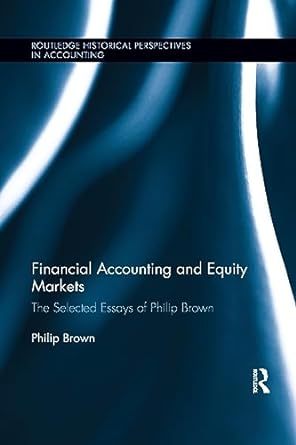Question
Which of the following is not a requirement for a like-kind exchange? A) The property received and the property given up in the exchange must
Which of the following is not a requirement for a like-kind exchange?
A) The property received and the property given up in the exchange must be business or investment real property.
B) The property must not be property held for sale in the ordinary course of business.
C) There must be an exchange of identical tangible property.
D) The property to be exchanged must be identified within 45 days.
E) (a) the 180th day after the date on which the taxpayer transfers the property given up, and (b) the due date, including extensions, for the taxpayers return for the tax year in which the transfer of the property given up occurred.
A ten-year lease called for the lessee to pay the first years rent (January through December) in advance. The lease was signed in November of the year preceding the commencement of the lease and a years advance rental payments were paid upon execution of the lease. Which of the following statements is true regarding the transaction:
A) The lessee, a cash basis taxpayer, can deduct a full years rent payment in the tax year in which payments were made.
B) The lessee, a cash basis taxpayer, cannot deduct any rent payment until the lease commences.
C) The lessor can exclude the advance rents when received.
D) All of the above are true.
E) None of the above is true.
A Cross collateralization Agreement involves:
A) A method employed by a secured lender to secure a loan.
B) Pledging multiple properties to secure one loan.
C) The pledge under a mortgage of multiple properties to secure an unrelated loan.
D) All of the above
E) None of the above.
Which of the following statements is true regarding REIT?
A) A REIT is generally subject to the regular corporate tax but receives a deduction for dividends paid provided that the amount of the dividends paid is not less than 90 percent of its ordinary income.
B) A REIT may not publicly offer their shares.
C) A REIT may not have more than one hundred shareholders.
D) A REIT is generally subject to the regular corporate tax on all dividends paid to shareholders provided that the REITs distribution are classified as qualified dividend income subject to a capital gain rates amount and are not less than 90 percent of its ordinary income.
E) Losses suffered by a REIT are passed through to shareholders to be deducted by them.
Step by Step Solution
There are 3 Steps involved in it
Step: 1

Get Instant Access to Expert-Tailored Solutions
See step-by-step solutions with expert insights and AI powered tools for academic success
Step: 2

Step: 3

Ace Your Homework with AI
Get the answers you need in no time with our AI-driven, step-by-step assistance
Get Started


